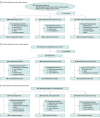Esketamine Monotherapy in Adults With Treatment-Resistant Depression: A Randomized Clinical Trial
- PMID: 40601310
- PMCID: PMC12224050
- DOI: 10.1001/jamapsychiatry.2025.1317
Esketamine Monotherapy in Adults With Treatment-Resistant Depression: A Randomized Clinical Trial
Abstract
Importance: Esketamine nasal spray, administered in conjunction with an oral antidepressant, is approved for treatment-resistant depression (TRD). However, the efficacy of esketamine nasal spray administered as monotherapy for patients with TRD has not yet been evaluated.
Objective: To assess the efficacy and safety of esketamine monotherapy compared to placebo in reducing depressive symptoms in patients with TRD.
Design, setting, and participants: This phase 4, double-blind, placebo-controlled randomized clinical trial was conducted from November 2020 to January 2024 at 51 outpatient centers in the US. Adults with major depressive disorder (DSM-5 criteria) without psychotic features who experienced inadequate response (≤25% improvement) to 2 or more oral antidepressants during the current depressive episode were eligible for inclusion. Data analyses were conducted from March 1, 2024, to July 8, 2024.
Interventions: After a 2-week or longer antidepressant-free period, participants were randomized at a 1:1:2 ratio to fixed-dose intranasal esketamine (56 mg or 84 mg) or matching intranasal placebo, administered twice weekly for 4 weeks.
Main outcomes and measures: Change in Montgomery-Åsberg Depression Rating Scale (MADRS) score from baseline to day 28 (primary efficacy end point) and to 24 hours post-first dose (day 2; key secondary efficacy end point) were analyzed by a mixed-effects model using repeated measures.
Results: In this multicenter randomized clinical trial, 378 participants who met prerandomization MADRS severity criteria received 1 or more study drug doses (esketamine, 56 mg [n = 86]; esketamine, 84 mg [n = 95]; or placebo [n = 197]). Mean (SD) participant age was 45.4 (14.1) years, 231 participants (61.1%) were female, and baseline mean (range) MADRS total score was 37.3 (28-50). At day 28, the least-square (LS) mean difference (SE) between esketamine and placebo was -5.1 (1.42) (95% CI, -7.91 to -2.33) for the 56-mg dose and -6.8 (1.38) (95% CI, -9.48 to -4.07) for the 84-mg dose (for each, 2-sided P < .001). Observed effect sizes were 0.48 and 0.63 for the 56-mg and 84-mg dose groups, respectively. At day 2 (approximately 24 hours post-first dose), the between-group difference was significant for both esketamine doses: -3.8 (1.29) (95% CI, -6.29 to -1.22; 2-sided P = .004) for 56 mg and -3.4 (1.24) (95% CI, -5.89 to -1.00; 2-sided P = .006) for 84 mg. The most common treatment-emergent adverse events reported for esketamine (combined doses) were nausea (56 participants [24.8%]), dissociation (55 [24.3%]), dizziness (49 [21.7%]), and headache (43 [19.0%]).
Conclusions and relevance: According to results of this multicenter, double-blind randomized clinical trial, esketamine monotherapy may expand treatment options for adult patients with TRD by addressing an unmet need of patients experiencing treatment-limiting tolerability concerns and nonresponse with oral antidepressants.
Trial registration: ClinicalTrials.gov Identifier: NCT04599855.
Conflict of interest statement
Figures


References
-
- World Health Organization . Depression and other common mental disorders: global health estimates. Accessed October 28, 2024. https://www.who.int/publications/i/item/depression-global-health-estimates
-
- Center for Drug Evaluation and Research, US Food and Drug Administration . Major depressive disorder: developing drugs for treatment. Accessed October 28, 2024. https://www.fda.gov/regulatory-information/search-fda-guidance-documents...
Publication types
MeSH terms
Substances
Associated data
LinkOut - more resources
Full Text Sources
Medical
Miscellaneous

